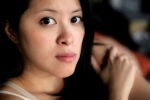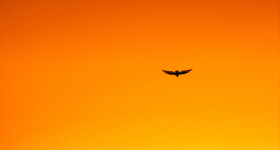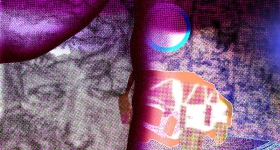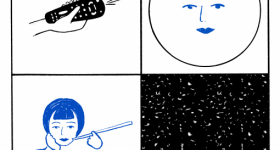Matthew Olzmann's poems are equal parts humorous, quirky, fantastical and emotional. When you enter an Olzmann poem, you often have no idea where he's taking you, but stick with his lines and before you know it, you've been sucker-punched and wishing for more. This is true of the poem he has in Issue 27, "Astronomers Locate a New Planet", which takes us to an imagined world made of diamonds and into their lives, unpacking into a love poem for our times. We chatted with him briefly about his poem, his new book Mezzanines, and his relationship to Asian American literature. He was also kind enough to do a recorded reading of his poem for us!
"Astronomers Locate a New Planet" by Matthew Olzmann
One of the things that really captured me about this poem was the way it opened in a beautifully imagined world and then moved into our very real world; specifically, the intimate space of the narrator's home. Of course, you headed the entire poem off with what I presume is a quote from a real article. Can you tell me a little bit about the evolution of this poem? What was it about the quote that captured your imagination, and did you start the poem knowing the direction this imagined world would take you (ie: into a meditation on love)?
The poem was triggered by an actual news story, and while I didn’t initially know where the poem would travel, the discovery of a planet made of diamond immediately caught my interest. It wasn’t necessarily the quote itself, or the story that captured my imagination, but the questions I had after reading the story. I’m intrigued by things that make me ask questions or make me wonder. The interrogative moment of “What if?” is a launching point for the imaginative, and here the question that arose first was, “What would it be like to live in such a place?” Many of my poems begin this way: something odd catches my attention, then leads toward flights of speculation, or an instant of wondering. An idea only begins to seem like a poem if it reaches that second stage. But it wasn’t until later, many drafts down the road, maybe when I got to the idea of the engagement ring, that the poem began to move toward its commentary on love.
The political message of the poem seems to be in response to the gay marriage debate, and, as the poem suggests, shaped by your own personal history and relationships, yet the poem itself is not overtly political in tone. Do you think of yourself as a political writer? What role do you think creative writing has in politics, and for you personally?
Yes, the poem alludes to being in a mixed-race relationship, my wife being African American, and the history—legal and otherwise—of such relationships in this country. And it’s definitely in response to the condition of marriage equality today. While there are parallels between those two elements, I didn’t set out to say, “Hey guys: situation A is kind of like situation B.” Rather, I simply wanted to focus on the idea of “love” in a society that insists on placing limitations and boundaries on love, and who is allowed to love, and how these limitations can be transcended. I didn’t think of this as a “political” poem when I wrote it, but it is exactly that. I thought of it as a love poem, but love and politics obviously aren’t mutually exclusive when we’re talking about the body and how desire is regulated and legislated.
I don’t think of myself as a political writer, but I do feel deeply invested in the world in which I live, and connected to those around me. Literature and creative writing make those connections more pronounced, more nuanced and intricate. The personal experience becomes public; the private moment is transformed into a communal event. Our stories are no longer isolated, but shared, and we experience them together. You might say the political value of creative writing is empathy, that in our shared stories, we understand each other more profoundly; we are more connected and more human.
Your first book, Mezzanines, came out a few months ago. What were the themes and obsessions that drove this collection? What direction do you see yourself (or have already been) moving in since then?
It’s always hard for me to talk of this book as a collection. I wrote these poems individually, one at a time, not thinking about how or if they were related to each other. There are poems about shipwrecks, asteroids, identity, and Bigfoot getting shot. If there’s anything that binds them, it’s an urge to try to understand what it means to be here—right now—alive in this peculiar moment, though they approach that question from different angles, usually with speakers who are completely unaware that they are wrestling with that question.
I’m not sure what direction I’m moving in now. I’m just trying to write “better” poems. I have a couple dozen or so newish poems that actually seem to be very much in conversation with one another, and another pile that’s a little bit more nebulous, a little trickier to define. I’ve also been working on some pieces of flash fiction, and a couple narrative essays. But it’s difficult to say in where these things are going. In the moment when I’m working on something, it’s like looking at a movie screen from two inches away; it’s impossible to see the whole picture when you’re that close to it.
As a Kundiman fellow and past winner of the Kundiman Prize, you must have a strong familiarity with the diversity of Asian American writers today. Where do you think Asian American poetry is headed and how has your biracial background complicated or enhanced your poetry and/or your relationship to the Asian American poetry community?
Initially, my relationship to an Asian American literary “community” began almost exclusively through Kundiman. Coming from Detroit, I didn’t really have access to that particular type of a community; I had an absolutely wonderful community of writers that I was fortunate to be a part of, but there were only two or three other Asian American writers that I knew. In a metropolitan area of a few million people, that’s not a huge number, and the few writers I’m referring to were spread out over a couple different cities. I think that’s one of many rare opportunities offered by Kundiman: a gateway to a larger community and a broader, national conversation. At the retreat, many of the fellows come from places where they’ve experienced various degrees of cultural isolation. Kundiman is a bridge that has connected many of us. My biracial background complicates my relationship to—everything, I guess—in that I carry my own odd baggage wherever I go. I question myself. I hesitate. Before applying to Kundiman, I wasn’t really sure if I was “Asian” enough, or what that meant. I spent a lot of time staring at the website in a state of wonder. One of the things that got me past that was seeing Jon Pineda listed on their faculty one year. That was 2006, I think. His book Birthmark explored a mixed race experience that, in many ways, was similar to my own and let me know that my experience wasn’t entirely unique, and that, in some ways, I was already part of this conversation whether I had known it or not. Also, at the retreat, I met countless other writers who had the same questions I had, the same doubts and anxieties.
I don’t know where Asian American poetry is going, and I don’t mind not knowing. I don’t feel compelled to try to define, or explain that direction. I leave that question as a humble gift for the scholars of tomorrow to have their fun with. Right now, it seems impossible to say what is next. But I’m excited by this impossibility and the difficulty of being able to pin anything down. It says that—right now—what it going on is too vibrant and varied for any easy classification. Actually, the wording of this question hints at this in suggesting the “diversity” of Asian American writers today. Diversity is a good word for the moment because, aesthetically, from what I can see, there’s not an Asian American poetry, but poetries: numerous and thriving. Literary. Spoken and performance-driven. Experimental. Reflective. Lyrical. Narrative. Tragic. Comic. Ecstatic. It’s all there.
Who are some of your influences and what were some books you read recently that really excited you?
My influences are too numerous to name, but lately I’ve been turning to poems by Robert Hayden and Wisława Szymborska with a fair frequency. And I often return to the work of Stephen Dobyns who was one of my teachers. His poems, essays and letters constantly inform me. The books I’m most excited about are all books that are about to be published: Blood, Sparrows and Sparrows by Eugenia Leigh, Hum by Jamaal May, Mad Honey Symposium by Sally Wen Mao, Split by Cathy Linh Che, and Seam by Tarfia Faizullah. These should all be out in the next year or so, so it looks like late 2013 through 2014 will be a good time for poems.










Comments